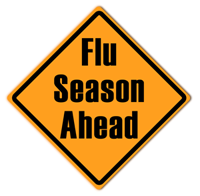With flu season around the corner, it’s time to think about getting your vaccination — and don’t forget, it takes two weeks for the vaccine to become effective. The CDC recommends getting it before flu season begins, which is typically sometime in October. Getting it later can still be beneficial, but sooner is better.
Flu season runs from October to May, with most cases happening from late December to early March.
There are a few reasons that you can still get the flu despite being vaccinated:
- You may be exposed to a flu virus shortly before getting vaccinated or during time it takes the body to gain protection.
- You may be exposed to a flu virus that is not included in the vaccine.
- Protection provided by flu vaccination varies based on health and age factors.
Reasons to be vaccinated:
- Can keep you from getting flu
- Can reduce risk of flu-associated hospitalization
- Protects women during and after pregnancy
- Can be life-saving for children
- Has been shown to reduce severity of illness in people who get vaccinated but still get sick
- Can protect people around you, including those who are more vulnerable to serious flu illness
The flu vaccine DOES NOT cause the flu. It can cause a few side effects such as redness and soreness at the injection site, low-grade fever and aches. The nasal spray can cause side effects in children that include runny nose, wheezing, headache, vomiting, fever and muscle aches. In adults, spray can cause runny nose, headache, sore throat and cough. If these side effects occur, they begin soon after vaccination and are mild and short-lived.
Who should have the vaccine:
- Everyone 6 months and older
- Anyone 65 years and older
- Women who are pregnant, considering pregnancy, have recently given birth or are breastfeeding during flu season
- Anyone with weakened immune system
- Residents of long-term care facilities
- Anyone with a chronic medical condition
- Kids or teens who take aspirin regularly and are at risk for developing Reye syndromeif they get the flu
- Caregivers or household contacts of anyone in a high-risk group (like children younger than 5-years-old, especially those younger than 6 months and those with high-risk conditions)
- Native Americans and Alaskan Natives
Talk to your doctor to see if the vaccine is still recommended if your child has ever had a severe reaction to a flu vaccination or has had Guillain-Barre syndrome.
Flu vaccines are typically available at:
- Health care facilities including doctors’ offices and public, employee and university health clinics
- Pharmacies/supermarkets
- Some community groups or centers
- Some schools
Sources: https://kidshealth.org/en/parents/late-flu-shot.html, https://www.cdc.gov/flu/prevent/keyfacts.htm


